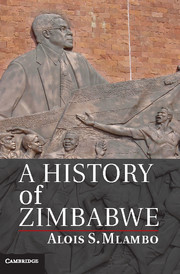Book contents
- Frontmatter
- Dedication
- Contents
- Figures
- Tables
- Maps
- Acknowledgements
- Timeline
- Notable Figures in Zimbabwean History
- 1 Introduction: Zimbabwe in Historical Perspective
- 2 Early States, c. 900–1900
- 3 The British Conquest State
- 4 Colonial Economy and Society to 1953
- 5 The Federation Years, 1953–1963
- 6 Nationalist Movements to 1965
- 7 Unilateral Declaration of Independence and African Response
- 8 Independent Zimbabwe, 1980–2000
- 9 The Crisis Years, 2000–2008
- 10 Conclusion: Zimbabwe Past, Present and Future Prospects
- Select Bibliography
- Index
- References
9 - The Crisis Years, 2000–2008
Published online by Cambridge University Press: 05 June 2014
- Frontmatter
- Dedication
- Contents
- Figures
- Tables
- Maps
- Acknowledgements
- Timeline
- Notable Figures in Zimbabwean History
- 1 Introduction: Zimbabwe in Historical Perspective
- 2 Early States, c. 900–1900
- 3 The British Conquest State
- 4 Colonial Economy and Society to 1953
- 5 The Federation Years, 1953–1963
- 6 Nationalist Movements to 1965
- 7 Unilateral Declaration of Independence and African Response
- 8 Independent Zimbabwe, 1980–2000
- 9 The Crisis Years, 2000–2008
- 10 Conclusion: Zimbabwe Past, Present and Future Prospects
- Select Bibliography
- Index
- References
Summary
Introduction
The first decade of the new millennium found Zimbabwe in the throes of a severe political, economic and social crisis that reversed the gains and achievements of the 1980s and deepened the problems and challenges facing the majority population, which had begun in the 1990s with ESAP. The crisis also turned the country into a pariah state, as human rights violations and political intolerance led to worldwide condemnations of the country’s ruling elite, and a chaotic land reform programme turned the region’s erstwhile breadbasket into a land dependent on food aid. This chapter examines the factors that led to the Zimbabwean crisis and its sociopolitical and economic manifestations throughout the first decade of the twenty-first century. It also analyses regional and international responses to the crisis, with a special focus on the SADC and the Western world.
Politics
The year 2000 marked the beginning of a turbulent time in Zimbabwean politics, one characterised by mounting political opposition to ZANU-PF rule and by increasing political repression of opposition forces, particularly the MDC which presented the strongest challenge to the ruling party. It witnessed a referendum, three controversial elections and growing use of violence and abuse of human rights by ZANU-PF structures. The decade ended with the formation of a Government of National Unity following the intervention of SADC, the regional organisation, first under the auspices of South African President Thabo Mbeki and then his successor, Jacob Zuma.
- Type
- Chapter
- Information
- A History of Zimbabwe , pp. 231 - 248Publisher: Cambridge University PressPrint publication year: 2014
References
- 1
- Cited by



